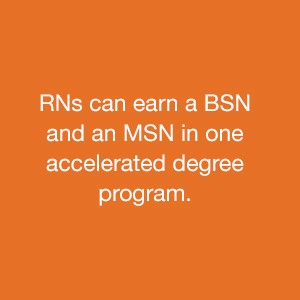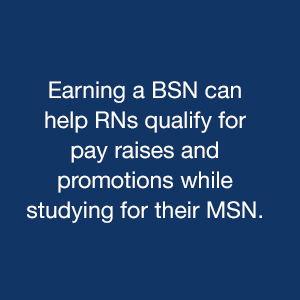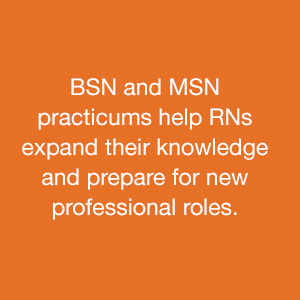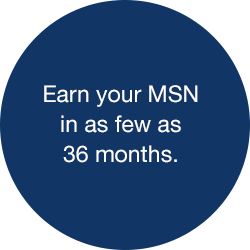Menu
FAQ: Online RN to MSN Programs

As a registered nurse, you already know that healthcare is a dynamic field, one that requires a lifelong commitment to learning. Healthcare systems are increasingly complex, and nurses are rising to the challenge by completing their bachelor's degrees. For RNs with an interest in leadership, education or advanced practice, a master's degree is the next logical step. If you plan to manage a nursing unit, work as a nurse executive or educate the next generation of nurses, an RN to MSN degree can help you achieve that goal.
Completing your BSN and MSN together in one program can speed your path to leadership. The RN to MSN online is not only faster than earning each degree separately, it's also less expensive. Studying online also allows you to advance your practice while maintaining your current employment and remaining on the frontlines of care.
From job options to tuition, there's a lot to consider before getting started. Follow the links below to learn more about this streamlined degree option.
What Is an RN to MSN Degree?

It's a degree that allows RNs to accelerate their studies, and earn both a bachelor's and master's degree in nursing. While the BSN has become the gold standard in RN education, nurses who plan to develop their leadership skills often earn a master's degree as well. Having both degrees can help you gain a competitive edge in the job market, increase your earning potential and speed up your career advancement. Enrolling in an RN to MSN program allows you meet those goals faster.
Typically, a BSN is a four-year degree and an MSN is a two-year degree, so it could take six years or more to achieve both milestones when completed separately. An accelerated online program can help you graduate in half the time, and also save you money on tuition. The University of Texas at Arlington's online RN to MSN program can be completed in as few as 36 months. Taking a full course load, you could go from ADN to MSN in just three years.
UTA also offers an
Can I Skip the BSN and Just Focus On the MSN?

Some RN to MSN programs focus strictly on the latter degree, but you may not want to do the same. The reality is that even experienced RNs can't skip straight to master's courses without the undergrad foundation they need to succeed in graduate study. ADN and diploma-prepared RNs must still complete their core BSN coursework (including master's prerequisites) before they can move on to advanced nursing classes.
If you need a BSN for a pay raise or promotion at work, completing the degree on the way to your MSN may also help you advance in your current job. In other words, it's a good idea to enroll in an RN to MSN program that also confers a BSN.

New knowledge becomes available constantly, and a good nurse works to incorporate that into one's practice.
—Regina Urban, Clinical Assistant Professor, UTA online RN to MSN program
How Do RN to MSN Programs Work?

Most RN to MSN programs lead to a BSN and a general or specialized master's degree. Paths to specialization include coursework for future nurse educators, nurse administrators and family nurse practitioners, among other options.
No matter which track is right for you, RN to MSN curriculum includes general education credits and nursing courses. Once you complete your undergraduate degree, you'll begin your graduate coursework. Some programs also allow you to start MSN courses sooner.
In the online RN to MSN program at UTA, you will work with an academic advisor to create a personalized course map. If you've completed your ADN and other general education requirements at a different school, your degree plan will account for transfer credits. That way, you can finish your bachelor's and move on to your master's as quickly as possible.
Which Courses Will I Take in an Online RN to MSN Program?
The general education and BSN classes required at the start of your online RN to MSN program can be taken simultaneously at some schools. After completing your bachelor's degree and transitioning to your MSN, you'll take core master's courses and select a specialization. In UTA's RN to MSN program, you can choose the nurse educator or nurse administrator track, or go the RN to MSN - FNP route.
Here are some of the topics your core RN to MSN courses will cover at UTA, regardless of specialization.
- Holistic health assessment and care across the lifespan
- Care for older adults and vulnerable populations
- Health promotion and healthy lifestyles
- Health policy
- Legal aspects of professional nursing
- Nursing research
- Nursing leadership and management
- Advanced nursing research and evidence-based practice
- The theory and philosophy of nursing science
- Assessment, curriculum development and evaluation in nursing education
- Teaching and learning theory
- Nursing education strategies
- Nursing informatics and healthcare data
You'll also complete courses in professional nursing practice, based on your specialization.
Which MSN Specialization is Right for Me?

Nurse educators and nurse administrators apply their leadership skills in different contexts, but as MSN-prepared RNs, both possess advanced knowledge in health assessment and evidence-based practice. Those who choose the nurse educator track will go on to share that knowledge with other RNs and future RNs. If you want to teach in classroom and clinical settings, lead hands-on practice experiences or administer simulated clinicals, the nurse educator track is a great choice.
Nurse educators facilitate patient care by supporting knowledge acquisition and professional development, and nurse administrators facilitate patient care by supporting and managing nursing teams. They each work in multiple healthcare settings to lead nursing units or departments. Some may serve at the executive level and lead entire hospitals.
Whether they work in the C-suite, an ambulatory clinic or a cardiac unit, nurse administrators know how to support bedside nurses while addressing operational logistics. If you're interested in strategic and fiscal planning, healthcare policy and team leadership, you might want to consider the nurse administrator track.
Which MSN Courses Will I Take to Become a Nurse Administrator?

From patient advocacy to financial planning, specialization courses for MSN administrators prepare you to transition from bedside nursing to a leadership role. You'll learn how to facilitate patient care from a big-picture perspective, manage nursing teams and navigate healthcare policy. In UTA's online RN to MSN program, courses in the administration track include:
- Nursing informatics
- Nursing Management in the Healthcare Environment
- Roles and Functions of the Nurse Administrator*
- Management Seminar and Practice*
- Financial Management in Nursing*
- Management of Nursing Operations*
- Nursing Leadership and Complex Healthcare Systems
- Nursing and Healthcare Policy
*Requires additional clinical or supervised hours in a healthcare setting.
Which MSN Courses Will I Take to Become a Nurse Educator?

If you plan on becoming a nurse educator, you'll gain advanced knowledge in many different areas of patient care and disease management. You'll also learn how to share that knowledge with other RNs by taking on an educational role in a variety of classroom and clinical settings. In the UTA online RN to MSN program, courses for the nurse educator track include:
- Curriculum Development and Evaluation
- Nursing Informatics
- Advanced Health Assessment and Diagnostic Reasoning
- Teaching and Learning Theories and Strategies in Nursing Education
- Assessment and Evaluation Strategies in Nursing Education*
- Role of the Nurse Educator
- Advanced Pathophysiology for Nurse Educators
- Advanced Pharmacology for Nurse Educators
- Advanced Care of a Client Population
- Simulation Application in Nursing*
- Nursing Education Practicum*
*Requires additional supervised hours in a healthcare setting.
Are Online RN to MSN Programs Accredited?
Many online RN to MSN programs are properly accredited, but not all. Accreditation is reserved for nursing schools that meet stringent standards. Accreditors look at program curriculum and instruction, career preparation, graduate success and more. Unaccredited programs may not be as academically rigorous, or have the level of fiscal responsibility and oversight required for approval.
UTA's online RN to MSN program is accredited by the Commission on Collegiate Nursing Education (CCNE).
How Does Nursing Program Accreditation Impact Students?

Unaccredited nursing programs can negatively affect your financial aid, tuition reimbursement and military education benefits — meaning that you will not be eligible to use any of those sources to pay for your degree. Credits from unaccredited programs don't typically transfer to other schools, and most doctoral programs don't accept applicants with an unaccredited master's degree.
Graduating from a program that's not accredited can also affect your future career. Employers heavily favor job candidates with accredited degrees, especially in the healthcare field.
How Can I Tell Whether Online Nursing Programs Are Accredited?
To confirm your program's accreditation status, be sure to search databases maintained by CCNE or the Accreditation Commission for Education in Nursing (ACEN). If your program appears on either list, you're good to go. If not, you may want to reconsider your options.
Are Nursing Practicums the Same as RN Clinicals?

No. You won't repeat your nursing clinicals during your RN to MSN program. Instead, you'll gain new skills in holistic healthcare, leadership, education and administration. Like your original RN clinicals, BSN and MSN practicum hours offer an opportunity to engage with your coursework through hands-on learning. You'll also get the direct experience you need in your new role to meet professional standards for the nursing education or administration field.
What Will I Learn During Practicum Hours?
Your MSN practicum will help you make the transition to advanced practice by integrating concepts of assessment and evaluation into a nursing framework. Future nurse administrators, for instance, can engage in interviews, observations, optional applied readings, quality management projects and community partnership projects. Future nurse educators, on the other hand, can learn to set up an online course, lead clinical lessons, create learning plans and implement learning evaluation strategies.
How Do Online Students Complete Practicum Hours?

Practicum specifics often vary by program, but yours may involve both simulation and face-to-face learning. If you're already employed in a healthcare setting, you might complete the practicum at your place of work. You have the option to choose other sites in your community as well, as long as your program approves. Keep in mind, however, that practicum hours are unpaid, and they must be completed outside of your assigned work schedule.
After completing practical experience in BSN and MSN common courses at UTA, students can begin a practicum that's tailored to their degree track. No matter which specialization you choose, at UTA these hours are built into your coursework. You can complete them as you move through the curriculum.
Will I Be Eligible for Additional Nursing Certifications with an MSN?

As an MSN-prepared nurse, you'll be eligible to earn advanced professional certifications that can help you gain a competitive edge in the job market. Certification can highlight your skills and competencies, and show employers that your knowledge remains up to date. That's because it often requires renewal through testing, professional development or continuing education.
Many MSN graduates demonstrate their teaching and training expertise by pursuing National League for Nursing certification, either as a Certified Nurse Educator (CNE) or Certified Academic Clinical Nurse Educator (CNEcl). Some employers prefer job candidates with this type of qualification.
Administrators may want to consider American Nurses Credentialing Center certifications for nurse executives, which recognize RNs for their leadership skills in clinical and management operations.
What Are My Career Options as a Nurse Administrator?

MSN-prepared nurse administrators have a vast array of career options across diverse healthcare settings. There are opportunities for nurses interested in policy, budgeting, management and public health. You might work as a practice manager in a healthcare provider's office, oversee a hospital care unit, lead a telemedicine company or direct a healthcare nonprofit. Whether you are interested in positions such as executive director of nursing, operating room nurse manager, chief nursing officer or clinical informatics manager, as a nurse administrator you will enjoy a wide range of career choices.
Nurse administrators in many fields can earn more than $100,000 annually, and salaries for hospital and healthcare executives tend to be the highest.
What Are Some Careers for Nurse Educators?

Nurse educators can pursue a number of different career paths, including some that offer shorter working hours and more flexible schedules that many roles for RNs. Those who teach online or lead simulated clinicals may even work from home.
If you prefer working in a clinical or classroom setting, you might join a hospital education department or a college nursing program as a faculty member. You can also serve as a patient educator for an insurance company or corporate wellness program, conduct professional development seminars for healthcare employers or join your local public health department.
Experienced nurse educators may also go on to work as university nursing program directors, faculty advisors or associate deans.
Salaries for nurse educators will vary by position and organization, whether you are working in a corporate, nonprofit or academic setting.
What's the Career Outlook for MSN Nurse Educators and MSN Nurse Administrators?

There is a strong need for MSN-prepared nurse educators and nurse administrators in all areas of healthcare, and demand should continue to rise.
The nationwide shortage of nursing faculty is one factor driving employment for qualified educators with a master's degree in the field. There is also a steady demand for nurse educators in patient care and other clinical settings, as well as corporate wellness programs, nonprofit health outreach, and local and state public health agencies.
Demand for highly qualified nursing administrators continues to rise as well, to meet America's growing need for efficient and cost-effective healthcare. Leaders with an MSN are prepared for the evolving landscape of medicine, and to meet post-pandemic supply chain and staffing issues. Nurses in management and executive roles are uniquely qualified to address these types of challenges.
Is Tuition for Online RN to MSN Programs Affordable?

Tuition for online RN to MSN programs can vary, especially when you consider the difference between for-profit, private and nonprofit universities. Programs with low tuition or that require fewer credits to graduate can sometimes end up costing you more if high student fees or out-of-state tuition are a factor.
ADN and diploma RNs often have some general education courses to complete for the BSN portion of the degree as well, so the total cost will vary by student. Many nurses find that online RN to MSN programs at public nonprofit universities can provide the best value overall.
At UTA, the nursing courses required to complete the RN to MSN degree cost $19,500 total, and you can also pay by the course if you like. Online students also pay the same tuition regardless of where they live.
Is Financial Aid Available to Online Students?
If your nursing program is accredited, you should be able to apply for most types of financial aid. Loans, grants and scholarships may be available, depending on your income and the cost of your program. Simply fill out the Free Application for Federal Student Aid (FAFSA) and your school will determine the type of aid it can offer.
Can I Qualify for Scholarships and Loan Forgiveness With An Online MSN?
All RN to MSN students have several options when it comes to scholarships and loan forgiveness programs. The AACN, for instance, offers a directory of scholarships and financial aid for nursing students at both the undergraduate and graduate level.
While scholarships don't require repayment, loan forgiveness is typically offered in exchange for a service commitment of at least two years. If you're interested in making a positive impact in an underserved area, or teaching at the college level after graduation, the following loan forgiveness programs are a great place to start:
Can I Use Military Education Benefits for My Online RN to MSN Degree?

Yes. Like federal financial aid, military education benefits can apply to degrees earned at accredited institutions. That's the case whether you decide to study online or on campus. You can estimate your benefits using the GI Bill Comparison Tool.
UTA is proud to provide a range of Military and Veteran Services for online students and their families. You can get assistance with applying for benefits, certifying them to pay for school and more.
Do Nursing Employers Provide Tuition Reimbursement?
Healthcare employers often provide tuition reimbursement, and that's great news if you're already working as an RN. Policies and reimbursement rates will vary, but increased competition for nursing talent across the country is now driving more employers to offer tuition assistance as a standard benefit. Check with your HR department to learn more.
Can I Keep My Nursing Job While Completing an RN to MSN Program?
Yes! Online degree programs are designed for working professionals, and it's a good idea to maintain your employment. Doing so allows you to implement the new skills you are learning and apply your new knowledge on the job.
Maintaining your career as you progress from RN to MSN also allows you to build your experience and resume, connect with potential preceptors and network in preparation for your future nursing role.
I Want to Graduate as Soon as Possible. How Fast Can I Earn My Degree?

Enrolling in an accelerated nursing program is one of the best ways to fast track your degree. While courses on campus take roughly 16 weeks to complete, accelerated online classes cover the same material in a matter of weeks. A standard bachelor's and master's degree can take full-time students six years or longer to complete, but students in online RN to MSN programs can finish in about half that time.
Most courses in UTA's accelerated online RN to MSN program are five-to-seven weeks in length. With a few exceptions, gen-ed courses are eight weeks in length. Enroll year-round or progress at your own pace. You can even graduate with your MSN in as few as 36 months.
Are Online Courses Easy to Navigate?

Yes, online courses have a user-friendly design that helps students find everything they need in one convenient place. They are administered through a web-based learning management system (LMS) with many aspects you can personalize to suit your needs.
Simply login to the LMS, select your course and enter your online classroom. You'll find links to discussion forums, video lectures and study materials. You can download the course syllabus and posted articles, upload assignments, and complete course modules. It won't take long to familiarize yourself with the layout and begin working on your assignments.
If you run into any technical issues in your UTA online courses, Canvas tech support provides assistance by phone or chat as well as links to tutorials and other resources.
Are There Technology Requirements for Online Classes?
Yes, but most students find them easy to meet. Start by checking the laptop, desktop or tablet computer you'll use to ensure that the operating system and web browser are up to date. You'll also want to verify that your internet connection is reliable. From there, just be sure you can:
- Stream audio and video
- Chat online (webcam and microphone required)
- Create papers, spreadsheets and presentations
- Store large files (on your computer or via cloud storage)
Your graduate program may have specific software or applications students need to use as well, so remember to ask about technology requirements when you apply.
What Should I Do If I Need to Meet With My Professor?

Your course syllabus will include your professor's preferred methods of communication, and you'll often have several different options for getting in touch. Some online faculty offer virtual office hours for video chats and phone calls. You can always reach out via email or LMS messaging too, which helps if you're up studying overnight after a long nursing shift.
Online discussion forums are another great way to communicate with your instructors, especially if your questions are relevant to your fellow classmates. You can always request a meeting by appointment as well.
No matter which option you choose, professors in UTA’s online RN to MSN program will respond within 24 to 48 hours.

I enjoy taking care of people and helping families as a nurse. I enjoy teaching and working with students to help them accumulate knowledge that will support their nursing practice.
—Regina Urban, Clinical Assistant Professor, UTA online RN to MSN program
Can Online Students Access Student Services?
Many universities provide online students with tech support, digital library access and research assistance. At UTA, the student services website is your online home base for library privileges and academic support. Important contact information for registration and tech support are also available.
UTA online RN to MSN students are assigned an academic advisor as well. Your advisor will help you create a personalized degree plan, check in with you regularly, and provide support on your path to graduation.
What Are the Admissions Requirements for Online RN to MSN Programs?

Online RN to MSN admissions policies and criteria change from program to program, but the general requirements for most remains the same. You'll need a valid, unencumbered RN license and one to two years of RN experience. College transcripts are part of the application process, and your program will confirm your GPA meets admission standards. Transcripts are also used to determine your transfer credits.
Aside from these general requirements, some RN to MSN programs may request professional recommendations and/or personal statements. You may have to agree to a background check as well, similar to the type most healthcare employers request for nursing applicants.
Admissions requirements for UTA's online RN to MSN program include a valid RN license, two years of RN experience, official transcripts and a minimum 3.0 GPA.
When Can I Enroll?
On-campus MSN programs offer enrollment opportunities only a few times per year, usually once in the fall and spring semesters, and twice in the summer. In an accelerated online nursing program, you can enroll in new courses six to eight times a year on average. Most students can begin their first course within a month or two after acceptance.
The accelerated online RN to MSN program at UTA offers rolling admissions, and new classes begin eight times each year. To get started, just check out the course calendar, collect your transcripts and apply online.